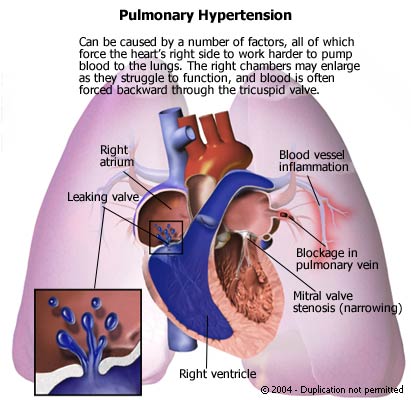4
Contents
Medications
Many different types of medications are available to treat pulmonary hypertension. Treatment choices, such as those listed below, depend on the severity of pulmonary hypertension, the likelihood of progression, and individual drug tolerance.
- Oxygen — replaces the low oxygen in your blood.
- Anticoagulants or “blood thinners” such as warfarin sodium (Coumadin) — decreases blood clot formation so blood flows more freely through blood vessels. Note: when taking anticoagulant medications, it is important for you to monitor bleeding complications and have regular lab work to monitor the level of medication in your bloodstream.
- Diuretics or “water pills” [such as furosemide (Lasix)] — removes extra fluid from the tissues and bloodstream, which reduces swelling and makes breathing easier.
- Potassium (such as K-dur) — replaces potassium (an essential nutrient) that may be lost with increased urination when taking diuretics.
- Inotropic agents (such as digoxin) — improves the heart’s pumping ability.
- Vasodilators [such as nifedipine (Procardia) or diltiazem (Cardizem)] — lowers pulmonary blood pressure and may improve the pumping ability of the right side of the heart.
- Bosentan (Tracleer) — helps block the action of endothelin, a substance that causes narrowing of lung blood vessels.
- Epoprostenol (Flolan), treprostinil sodium (Remodulin), iloprost (Ventavis) — dilates pulmonary arteries and helps prevent blood clots from forming.
- Sildenafil (Revatio) — relaxes pulmonary smooth muscle cells, which leads to dilation of the pulmonary arteries.


Comments 1
Pingback: Obesity and a decreased heart function - Cardiac Health